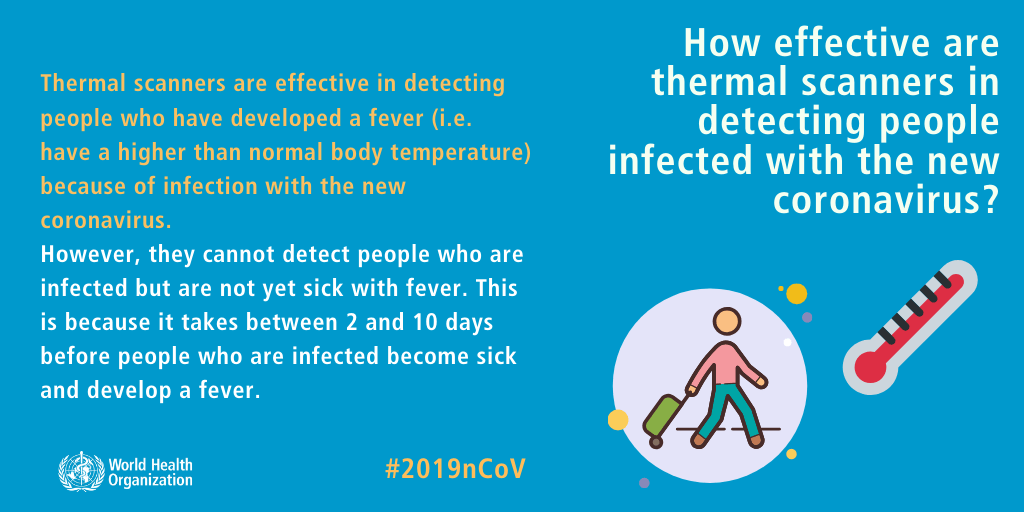On Monday 23 March 2020, UK Prime Minister Boris Johnson ordered the UK public to stay at home for at least three weeks in order to slow the spread of Corona Virus (COVID-19) through social distancing measures.
It is hoped social distancing will eventually lower the number of new cases and that eventually the virus will die out. However, as people begin to resume normal life by returning to work, gathering in crowds and using public transport, the use of body temperature fever scanning thermal camera systems could be a way to identify persons that display symptoms of high temperature, which may indicate underlying infections and could assist in the early detection to help prevent future pandemics.
The latest pandemic has been caused by Coronavirus (COVID-19), an infectious virus that causes acute respiratory syndrome. It has a very high infection rate and is spread by droplets when people cough or sneeze. The Coronavirus was first identified in 2019 in Wuhan, China, and has since spread globally. The first reported case in the UK was on 12 March and the World Health Organisation officially declared it a pandemic on 30 January 2020.
Human body temperature screening systems could be of immediate assistance over the next few months to prevent people unknowingly taking the virus into vulnerable places such as hospitals, shops, construction sites and other places that have been permitted to stay open. Symptoms include high body temperatures; the thermal scanning will be able to identify multiple persons at once and indicate anyone that displays are higher than normal body temperature – all from a safe vantage point negating human interaction. This can then alert system operators, and that person can be segregated and further tests carried out in a safe area, away from general footfall traffic. The current system is accurate to within 0.3 degrees.
One of symptoms of the current COVID-19 virus is a high temperature, and whilst thermal body temperature scanners can’t identify those who already have the virus – it can take between 2 and 10 days for people to become sick – fever scanning thermal camera’s can help to identify people with a higher than normal temperature and ensure they immediately begin self-isolation and can seek urgent advice.
Those infected with the COVID-19 virus may be asymptomatic or develop flu-like symptoms, including fever, cough, fatigue, and shortness of breath. In 87% of cases a fever is present therefore the ability to identify people with a high temperature could help to prevent the further spread of the disease.
A normal body temperature in adults is 37°C or 98.6°F – and, for children and babies around 36.4°C or 97.5°F. Depending on how active and the time of the day it is, a person’s temperature can fluctuate 0.6°C or 1°F above or below this throughout the day. A body temperature above this could be signs of fever and sickness.
In order to check their daily temperature many people purchased their own thermometer, which led to worldwide shortages and limited the ability for people to test their body temperature.
Tecserv UK is an SSAIB certified company and able to install and maintain human thermal screening systems that can monitor multiple persons and give their temperature from a safe distance. We can install systems as a stand-alone installation or integrated to be part of an existing CCTV surveillance system.
These systems are ideal for identifying persons who are potentially unaware of their symptoms and allows “screening” from a safe area. These persons identified with a high temperature can then be screened and checked in more detail before they enter or exit public, commercial or industrial areas in by medical professionals.
Human thermal screening systems are most applicable for installation at entrances and exits to screen people leaving, working in and entering transport hubs such as rail and bus stations and airports; public buildings such as hospitals, libraries and offices; and commercial and industrial applications where large numbers are employed such as construction sites, call centres, shopping centres and factories. Particularly if people will be in close proximity of each other.
Early detection of the virus will limit its spread and allow the NHS and emergency services infrastructure to cope with already increasing numbers of confirmed cases.
As part of existing COVID-19 operating procedures, the installation of human body temperature screening systems should be considered during risk management and business continuity assessments and form an integral part of health & safety policies that enable companies to detect potential virus carriers.
If you would like further information about human thermal screening systems please get in touch.


Mick has over 30 years experience working within the Fire and Security industry. Starting as an installation engineer and quickly progressing into both operational and sales management roles.